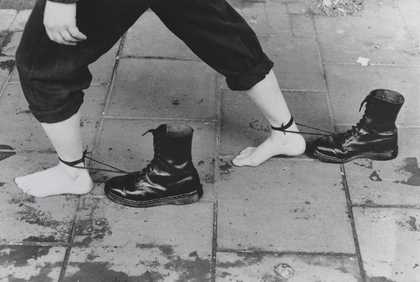This panel discussion brings together three speakers, each focusing on one work of their choice from the show, to reflect on HatoumÔÇÖs sophisticated manipulation of materials and their metaphorical potential. ┬áWhat are the personal, emotional and phenomenological effects that the chosen works have had on the individual speakers in relation to their own research practice, interests and┬áexperiences?
Mona Hatoum creates a challenging vision of our world. Her sculptures and installations subvert the formal language of minimalism, introducing traumatic and political themes that expose the contradictions and complexities of today. Displacement, uncertainty and the effects of power structures are addressed through the use of familiar objects and materials transformed into foreign or uncanny things. Throughout her career Hatoum has aimed to engage the viewer, soliciting interpretation and eliciting emotional and physical responses.
Speakers include academic and researcher Layal Ftouni, art historian Professor Irit Rogoff and author Adania Shibli. The panel discussion is chaired by Morad Montazami, ░ı▓╣│┘▒ÔÇÖs Adjunct Research Curator for Middle East and North┬áAfrica.
This event has been provided by Tate Gallery on behalf of Tate Enterprises LTD
Biographies
Layal Ftouni (born 1982) is a senior teaching fellow at SOAS, University of London and doctoral candidate at the University of Westminster (CREAM). Ftouni is a co-founder of Arab Cultural Studies Group and is currently working on a book with Tarik Sabry titled; Arab Subcultures: Transformations in Theory and Practice (I.B. Tauris 2016).
Morad Montazami is ░ı▓╣│┘▒ÔÇÖs Adjunct Research Curator for Middle East and North Africa, supported by the Iran Heritage Foundation. He was co-curator of UNEDITEDHISTORY: IRAN 1960ÔÇô2014 at Musee dÔÇÖart moderne de la ville de Paris and MAXXI Rome in 2014ÔÇô2015. He is the editor in chief of the French journal Zam├ón, which deals with Middle Eastern studies, visual culture and contemporary┬áart.
Irit Rogoff is an art historian, theorist and curator whose work explores critical, political and contemporary arts practices. Rogoff is Professor of Visual Culture at Goldsmiths, a department she founded in 2002. Her work across a series of PhD programmes is focused on the possibility of exchanging knowledges across professional practices, self-generated forums, academic institutions and individual enthusiasms.
Adania Shibli (born 1974) has written novels, plays, short stories and narrative essays. She has been awarded the Young WriterÔÇÖs Award-Palestine, by the A.M. Qattan Foundation in 2001 and in 2003. In addition to writing fiction, Shibli is a visiting professor at Birzeit University,┬áPalestine.
Tate Talks is supported by The J Isaacs Charitable Trust
This event has been provided by Tate Gallery on behalf of Tate Enterprises LTD

